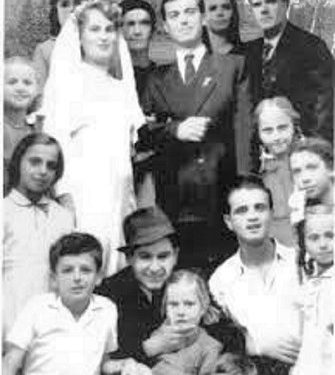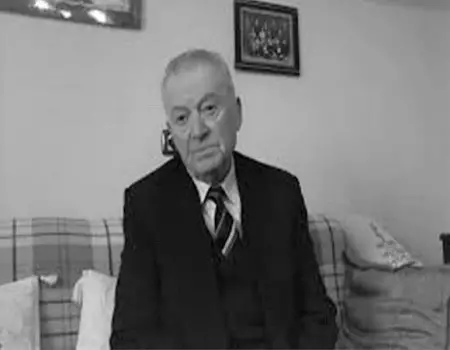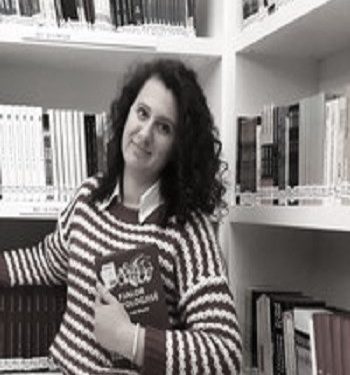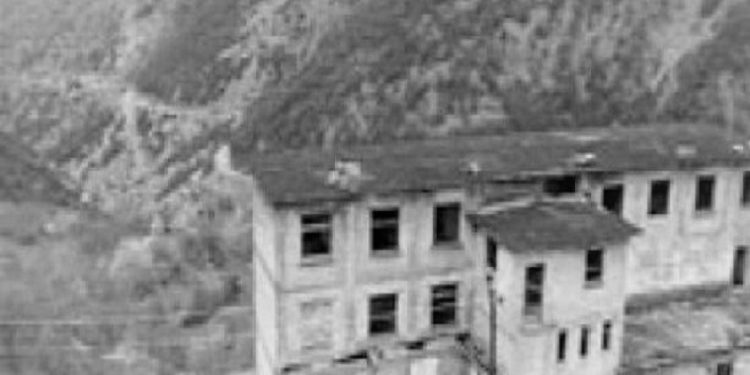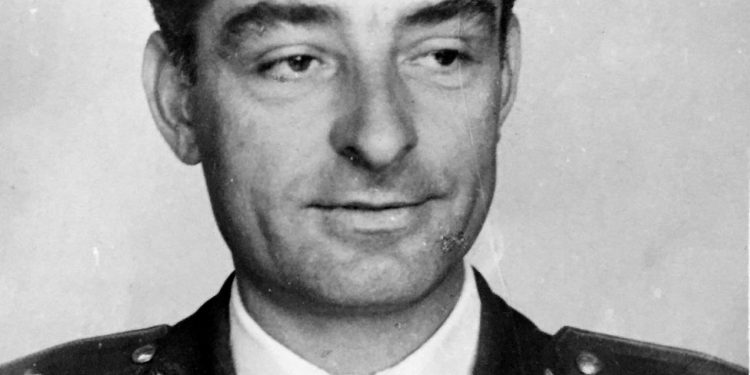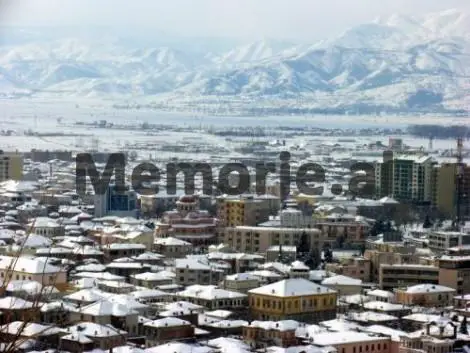By Najada Pendavinji
– The former student of Poland tells how they bled him in the interrogator, the nights waiting for the shooting and the Polish wife who drove him crazy in the interrogator! –
Memorie.al / “There were few nights when I slept from the evening until the morning, because it was these noises in the corridors that made me think it was my turn. Finally, one day, on the 19th day, the door of the dungeon was opened and a large group of policemen and the prison commander, Banush Goxhaj, entered. He ordered to remove my handcuffs and said: ‘We have come to give you news, your life has been spared and your sentence is 25 years in prison’. I thought he was making fun of me, and shivers went through me, as if I were between two poles of an electric current, from the top of my head to the top of my foot.”
Vaskë (Vasillaq) Orgocka is one of the victims of communist crimes, who experienced a long ordeal of suffering and punishment as a result of his marriage with a foreign Polish woman. He comes from a prestigious family in the city of Korça, where his brother, Dhimitër Orgocka, was one of the great directors of the Korça scene and until that time, it was treated by state politics as a privileged and honorable family. .
Vaskë Orgocka finished his studies in Warsaw, Poland, with the approval of the state, and while he was a student in 1954, he met a Polish girl named Barbara (Başen). In 1955, he returned from Poland and after a year, in 1956, Barbara, his wife, also came.
The ordeal of suffering and persecution began in 1961, immediately after the breakdown of relations with the Soviet Union and other People’s Democracies. In this period, the persecution of foreign women who had married Albanians and who had created their families while living and working in Albania began.
As a result of this repressive policy, Orgocka and his wife Barbara faced the fierce persecution of the communist regime. He was arrested in 1968, under the initial charge of “agitation and propaganda” and was held in the investigator’s cell for about a year, being then sentenced to be shot, because his wife was described as an “agent and colonel of the Polish state”. .
His wife was sentenced to 25 years in prison, where she suffered a great mental shock and did not recognize her husband and children.
The full testimony of the former political prisoner, Vaskë Orgocka
Mr. Orgocka, what was the reason that communism started persecuting you?
I still don’t know the reason why my wife and I experienced that persecution of that system, but in time I can say that the cause was the deficiency, the flaws of that regime at that time and our arrests were excuses to cover up the crimes of that political. While the genesis of my persecution is related to the fact that I had created a family with a Polish woman. I was a student in Warsaw, in Poland, with the approval of the Albanian state, of course, and in the last year of my studies, i.e. in 1954, I met a Polish girl who would later become my wife.
We stayed there for about a year, where I took her to the parties organized by the Albanian Embassy or the students in Poland, and after the party, our ambassador to Poland, who at that time was Petro Papi, called me and said: “She is the daughter of well, why don’t you marry her? You know that our policy is to get as close as possible to them”. I was a bit embarrassed, as I didn’t know how to answer, and I told him we’ll see he went ahead and said do it… and I can say that this was like an impetus and that’s how we decided to get married.
We had the official marriage in Korça, after I returned in 1955, while Barbara came a year later, in September 1956, due to the procedures. We lived together for about 12 years in Korça. During that time, I was working in the State Committee of Geology in Tirana, as a geologist, with the chairman of the committee, Panajot Plakun. He transferred me to Mirdita, where I spent the most difficult and bitter years of my life in Spaç, then he took me to Përrenjas and finally, I was transferred to the Mborje-Drenova mine.
While the wife had done a laboratory course and worked at the Beer Factory in Korça. During this time, my two children were also born. Then, their coup happened and our family was finally destroyed in the impossibility of being reunited. I personally assure anyone that I legally owe neither the government nor any person in particular, for the persecution of me and my wife.
When exactly did the persecution begin?
I mentioned a while ago that until the moment of arrest, we were a family that lived very well compared to others. But the year 1961 came; the politics of the state changed, the relations with the Soviet Union and the countries of people’s democracies were broken, so they started to see us with a different eye. In 1962, that persecution began against all foreign women who had married Albanians.
At this time, I asked the woman to leave together with the children, but she refused, as she thought that the family was sacred and not touched by anyone. And so, the moment of my arrest came. At the beginning of December 1968, I was arrested in the office and taken to the Internal Affairs Branch, here in Korça, where I stayed until the end of February 1969.
The first accusation against me was that of “agitation and propaganda”, because according to those who had spied on me, who were Vangjush Raci, my office colleague, Xhevdet Dervishi and a Polish woman married in Korça, (Kristina Gjashta ), I had expressed that: I was not happy that we had broken with the Soviet Union. In the dungeons of Korça, I was kept for almost four weeks, which I can say was really a concrete tomb.
Then, they transferred me to Tirana, because according to them, they gave another importance to the investigation and the judicial process of the family. There in Tirana, the real ordeal of suffering, torture and psychological and physical violence began, as their goal was for me to admit that my wife was an agent and I was her accomplice.
Who were your investigators? What were the tortures they used on you?
The investigation process lasted almost a year, and during this period, my case was reviewed by several investigators, whom I will mention now. During the investigation in Korçë, my investigator was Odhise Porodini, a Gyrokastrite, but who was on duty here in Korçë. For a moment, I thought that my investigation was over… but no, I was transferred to Tirana, in Prison 313, where I continued the investigation with Koço Josif, who was the head of the Investigation for Tirana.
But the head of the Investigation for the entire Republic was Ferat Matoiti. The name of this one will appear a little below, because under his direction, the investigation began in Tirana. When I started with Koço Josif, he told me: “You ate the soup in Korçë, now let’s look at the meat bundles that you will have here in Tirana”. In this investigation process, physical violence also began, where during the interrogation in most cases; they put us on concrete chairs and kept us with our hands tied behind the chair, exercising physical torture, until bleeding and endless psychological pressure.
During the investigation, I remember that Feçor Shehu came to me one day. I didn’t know who he was, but his image stuck in my mind. It was a fat, yellow face, beaded with sweat, and immediately gave the impression of a heartless criminal. When he entered the door, the investigator was standing ready in front of him. I was surprised, since Koço Josifi was one of those investigators who, together with Mehmet Shehu, killed people inside the dungeons, especially in the case of the bomb explosion in the Soviet Embassy.
Feçor Shehu saw me and said to the investigator: “But who is this?” Are you still dealing with this? Take it and make a knot and throw it away,” he said and left. This was the instruction of Feçor Shehu, to kill me. While Koço Josifi tells me that this man has your life and mine in his hands. The investigation continued and another person would come to me. He was Ferat Matoiti, who was the author of all the physical torture he did to me. At that time, he was Director of the Directorate of Investigation for the Republic.
On one of these days, he beat me badly, punched me in the face, breaking two of my jaws, I bled all over, they took me to the dungeon and the blood was pouring out as I was left with a head, which caused me excruciating pain. And in this way, I was forced to ask for the help of a dentist to pull it out, but the one who came was not a dentist, he was a “nallban”, one of those who shoe horses with horseshoes, and with a pair of tongs of those who remove the nails, pull out the root with a part of the jaw.
There, for the first time, I lost consciousness. The place became infected, I was bleeding and in this way, I asked the policeman for some salt, which was not cleaned, but which saved me. So the conditions in the investigator were to kill you without a bullet, and the investigators were really people chosen to commit crimes against people.
How did you experience the firing squad?
The investigation lasted almost a year and after it, according to the rules, a trial was held, which lasted a week and I was sentenced to death in this trial. In our group, there were two of us who were sentenced to be shot; he was a friend of mine, a mechanical engineer from Durrës. When the policeman came, he opened the counter and told me, supposedly secretly, don’t be afraid, the other one will be shot but you won’t, while he was told the same thing.
Since the end of the trial, I was handcuffed behind my back and those irons were never removed, until my life was spared after 19 days of waiting for my shooting. Living with the thought that you will be killed, you will be shot for no fault, without any reason, only after the Supreme Court College made this decision, was terrible. I was only 35 years old; I didn’t know what could happen to my wife and my children.
Sooner or later, my shooting would happen, and I just waited, watching for every movement, especially at night, as the guards took the prisoners to the interrogator or to be shot. There were few nights when I slept from night to morning because it was these noises in the corridors that made me think it was my turn. Finally, one day, on the 19th day, the door of the dungeon was opened and a large group of policemen and the prison commander Banush Goxhaj entered.
He ordered to remove my handcuffs and said: “We have come to give you news, your life has been spared and your sentence is 25 years in prison.” I thought he was making fun of me, and shivers went through me as if I were between two poles of an electric current from the top of my head to the top of my foot.
What happened to your wife? Did you meet your wife during that time?
My wife, Basha, was arrested the day they brought me from Korça to Tirana, at the end of February 1969. I remember that when I went from the investigation to the dungeon, I saw her clothes, which I recognized. Baša was sentenced to 25 years in prison, but since there was a strong intervention by the Polish state, she was released, giving her a forced trial, since they had to prove her guilt to the Polish state, and from 25 years she was sentenced to 3 years, because foreign citizens at that time were punished according to the law from 1 to 3 years, this for the crime of “agitation and propaganda”.
Yes, I met the woman during the period when we were in the investigator and when the trial was held. Before the trial, these meetings were organized in such a way that it was a commission and a meeting was held between the prisoners to discuss what the interrogators had prepared to say to each other. There I saw the woman in a terrible state, she was disfigured, and so much had changed. She only had on her body a dress and a pair of shoes. He saw me, recognized me and grabbed me around the waist and started crying.
Several police officers, investigators Koço Josifi, Ferat Matoiti, and an interpreter, since the woman was of foreign nationality, who was Osman Kraja, participated in this trial, but he was not an interpreter. He filled in all that the prosecutor could not say. A moment passed and she said to me: “Do you see that man over there?” and her gaze was on Ferat Matoiti. He was a tall man, with curly gray hair and a black face, and he tells me: “That man has a soul, blacker than his face”, but in Albanian.
That was the meeting with the woman. When the trial was held, there was also the woman who was accused of being an agent and colonel of the Polish secret service. But how could an 18-year-old girl be a colonel? When the indictment was read, she stamped her feet. This was her way of protesting all that was being said in court. He was excluded from the trial and they were forced to convict him in absentia.
During that period, my wife also had a mental disorder, after the psychological and physical tortures they had inflicted on her in the interrogator. He was also drugged. I proved this when I went to Poland, after the 90s.
Where did you serve your sentence, in what prison or camp?
I pointed out a little while ago that the Presidium of the People’s Assembly spared my life, sentencing me to 25 years in prison. After two weeks that I was kept in the kaushets (rooms that served as a transit for the distribution of convicts in labor camps), I was taken to Spaçi prison camp.
I was a geologist by profession and I knew very well how it worked, what conditions, technical insurances, rules there were in mines, and I was one of those who controlled the implementation of these rules. But when I went to Spaç, I put my head in my hand, and I was surprised that people here come in and come out alive.
Terrible were the working and living conditions in the Spaçi mine. In this mine, copper and pyrite were produced. I worked in the pyrite galleries and in this sector, it was truly hell. If there is hell anywhere in this universe, there was hell. Our whole body was covered with yellow spots, as all the water in the gallery was saturated with sulfuric acid. The food was insufficient to support the hard work we were doing. These were the horrors of that prison.
How did your family life continue and did you reunite with your wife after those years of separation?
My wife Basha was released in 1971, at the request of the Polish state. And immediately she went to Poland, but because of her health condition, she was taken from the dungeons to the airfield on a stretcher and brought down to Warsaw on a stretcher, from the plane to the hospital. She lived in the hospital for six months, being treated for her mental condition, which was the result of not only the shock, but also the excessive amount of narcotics, which damaged her brain.
He could not take the children due to health reasons and they stayed with my parents. As for me, my sentence was reduced to 17 years in prison and I was released in 1985, as they also knew very well that I had not done such a thing out of debt, just because that was their policy. Finally, they came and told me bluntly, “You tell the truth to your family, you don’t have to talk to others”.
After the 1990s, together with the children, we would go to Poland to meet my wife, and the absurdity of it all was that the Albanian embassy did not approve my visa to Poland, as I was a political convict. My whole family could go overseas, but I couldn’t.
Even after the political changes that took place in Albania, the communist ideology still worked. Finally, my visa was approved and I went to see my wife, but she was in such a state that sometimes she would accept me and sometimes she would not, and there were times when she would call the police and tell them that three people have come to they kill me They destroyed my life and family, for no reason! Memorie.al




